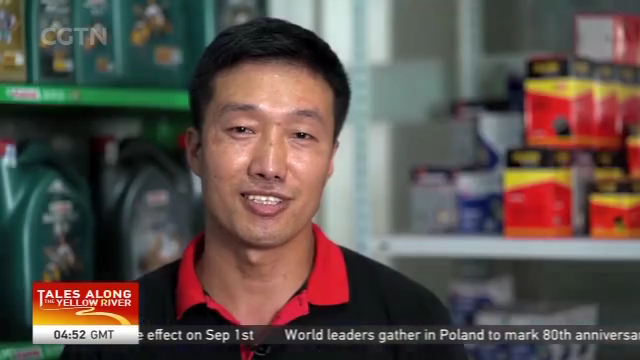
14:37, 01-Sep-2019
Tales Along the Yellow River: Two generations tell the story of a changing China
Updated
14:49, 01-Sep-2019

In our latest installment of Tales Along the Yellow River, we take you to northwestern China's Loess Plateau. The Yellow River passes through its upper and middle reaches, and it's where the river gets its large amount of sediment, hence its name. Thousands of years ago Chinese agriculture emerged on the soft and loose soil of the plateau and for today's leg of our journey, CGTN's Xu Mengqi takes us deep into the countryside to see what changes have unfolded in the region.
Many say if the Yellow River is the mother of Chinese civilization, then the distinctive Loess plateau, formed from age after age of ochre yellow wind blown sediment, is its father.
ZHANG TIEHUAI FARMER "Ask me how long we have lived in cave homes. My great grandfather, my grandfather, my father, and me; four generations, it's gotta be 200 years."
In many ways, 56-year-old Zhang Tiehuai leads a typical farmer's life on northwestern China's Loess plateau. For generations his family has ploughed the land here and lived in caves they dug out from its soil. Yet such a lifestyle is no longer what Zhang wants for his kids.
ZHANG TIEHUAI FARMER "Now we are better off and I can afford for my kids to get an education elsewhere. They all started their own businesses after leaving school."
ZHANG FEILONG SMALL BUSINESS OWNER "Now it's basically just the elderly who are left at home. People of my generation are either far away or in the nearest county town."
300 kilometers away in the bustling city of Xi'an, I met Zhang's son Zhang Feilong, who runs an auto repair shop on the outskirts of the city.
ZHANG FEILONG SMALL BUSINESS OWNER "I came to Xi'an in late 2006. I was thinking there would be more fun in the city and more job opportunities. There was no future for me back home. Medical services, education, these are all problems."
His choice to leave the countryside in search of a better life in China's fast growing cities is echoed by the nation's 288 million migrant workers. But while it is relatively easy to find a steady, well-paying job in China's cities, a sense of belonging is often a lot harder to come by.
ZHANG FEILONG SMALL BUSINESS OWNER "None of my relatives are here. I still feel like I'm just drifting around, you know?"
Zhang, however, is among the more fortunate transplants. Having already bought a house in Xi'an, he says his next goal is to have his parents move in with him.
Back on the Loess plateau, I ask Zhang Tiehuai, whether he feels sad about his kids leaving home. His answer seems to me surprisingly open-minded.
ZHANG TIEHUAI FARMER "It's a different time now. One generation shouldn't interfere with the next generation. I hope they will do better than me."
A change of heart, perhaps for the better, in this fast-changing China. XMQ, CGTN, Shaanxi Province.
SITEMAP
Copyright © 2018 CGTN. Beijing ICP prepared NO.16065310-3
Copyright © 2018 CGTN. Beijing ICP prepared NO.16065310-3